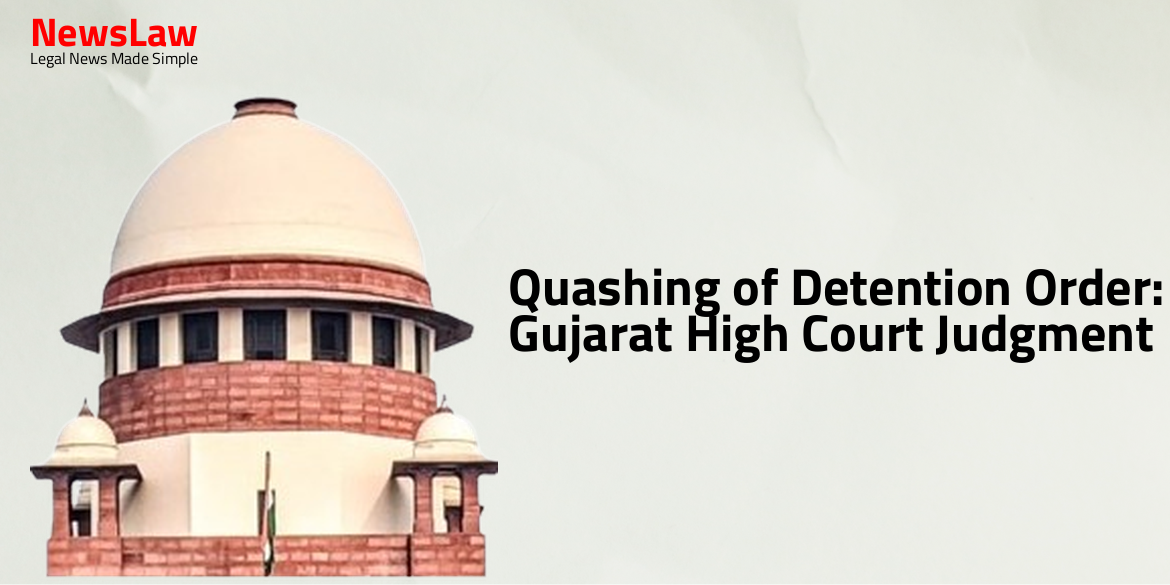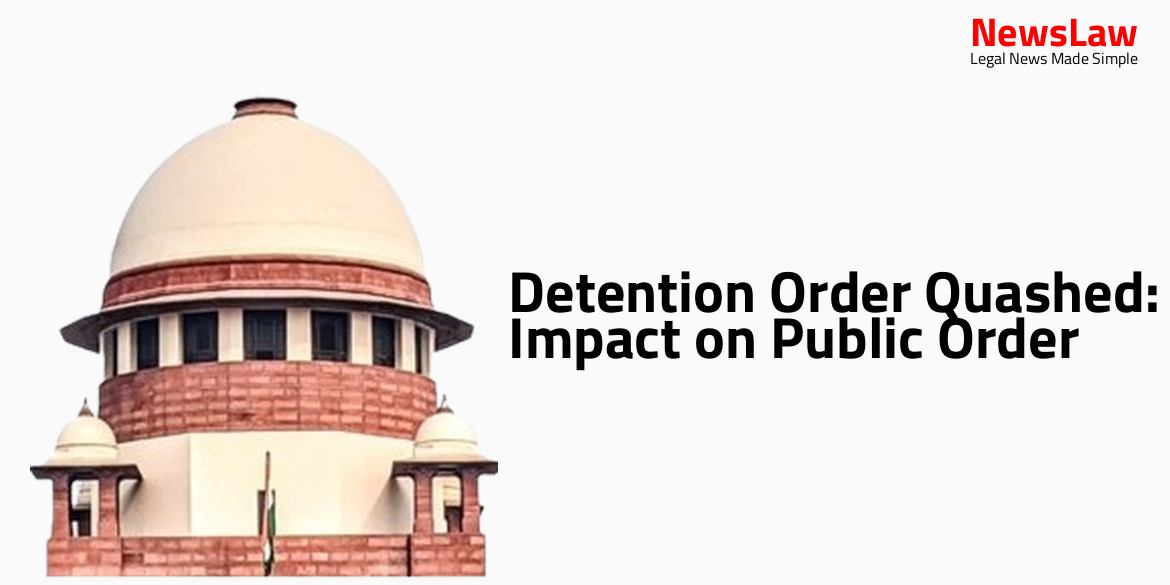In a recent landmark judgment by the Gujarat High Court, the detention order dated 11.01.2024 has been quashed. The case involved challenges to the order passed under the Gujarat Prevention of Anti-Social Activities Act, 1985. The petitioner’s advocate argued against the detention, highlighting the lack of substantial evidence to prove the alleged anti-social activities amounted to a breach of public order. Let’s delve into the details of this crucial legal decision.
Facts
- The present petition challenges the order of detention dated 11.01.2024 passed by the detaining authority under the Gujarat Prevention of Anti-Social Activities Act, 1985.
- The petitioner has been detained as per the powers conferred under Section 3(1) of the Act.
- The detention is in accordance with the definition of ‘detenue’ under Section 2(c) of the Act.
Issue
- The main issue in this case was whether the actions of the government were in violation of Article 21 of the Constitution of India.
- The court had to interpret the scope of Article 21 and determine whether the government’s actions infringed upon the fundamental rights of the individuals involved.
- Furthermore, the court examined previous case law and legal principles to assess the constitutional validity of the government’s actions in this case.
- The interpretation of Article 21 and its application to the specific circumstances of this case played a crucial role in the court’s decision-making process.
Arguments
- The petitioner’s advocate argues that apart from witness statements and FIR registrations, there is no substantial evidence to prove the petitioner’s alleged anti-social activities fall under breach of public order.
- The advocate contests that the petitioner’s activities, even related to criminal cases, did not significantly impact the social fabric or threaten normal life on a large scale.
- The order of detention is challenged as being solely based on the registration of three FIRs, which the advocate argues is insufficient to justify detention under the Act.
- The advocate emphasizes that the alleged illegal activities do not pertain to public order maintenance but rather constitute a breach of law and order.
- It is pointed out that the detaining authority failed to consider that the petitioner is out on bail for all the offenses mentioned.
- The detaining authority’s subjective satisfaction is found to be illegal and not in accordance with the law.
- The offenses alleged in the FIRs do not impact public order as required under the Act.
- Other relevant penal laws are adequate to address the situation.
- The allegations against the petitioner – detenue are not relevant for bringing them under Section 2(c) of the Act.
- For a person to be detained under the Act, they must pose a threat to society and disturb its tempo significantly, affecting public order.
- The AGP has supported the detention order, citing sufficient materials and evidence provided to the detenue.
- The detenue’s activities align with Section 2(c) of the Act as per the investigation findings.
- The detaining authority’s order is claimed to be appropriate and deserving of upholding by the Court.
Analysis
- The Apex Court has established the legal position in various cases.
- Preventive detention by a District Magistrate is permissible to prevent subversion of public order, not for the maintenance of law and order.
- Article 22 must be viewed as an exception to Article 21 and is applicable only in rare and exceptional cases.
- The hierarchy from security of State to public order to law and order is defined.
- The order does not mention any application for bail cancellation by the State authorities.
- Preventive detention should not be used as a remedy in inappropriate circumstances.
- The concept of ‘public order’ differs from ‘security of State’.
- The current case demonstrates a lack of consideration of relevant factors by the detaining authority.
- The FIRs against the detenu could be addressed through normal criminal law processes.
- The Court observed that a mere disturbance of law and order leading to disorder is not enough for preventive detention under the Defence of India Act, it must be a disturbance affecting public order.
- In recent cases concerning Telangana, the Court noted the routine and unjustified use of preventive detention laws, with multiple detention orders being quashed for incorrectly applying the standard for maintenance of public order.
- The Court directed the authorities to review pending challenges to detention orders and evaluate them against lawful standards.
- An act may affect law and order but not public order, just as an act may affect public order but not the security of the State.
- The Court emphasized that preventive detention is an exceptional and draconian power that should be exercised with extreme caution and in line with constitutional provisions.
- The distinction between ‘law and order’ and ‘public order’ was clearly explained, stating that disorder must lead to public disorder to meet the threshold for preventive detention.
- Courts have emphasized the importance of personal liberty and the need for exercising preventive detention powers with care and proper evaluation of the impact on public order.
- Preventive detention should not be used in place of ordinary criminal laws and is meant to prevent certain offenses for a limited duration.
- The Apex Court highlighted the necessity for scrutinizing orders of preventive detention when based on charges for which the individual is already on bail.
- Personal liberty protected under Article 21 is sacrosanct and high in the scale of constitutional values.
- Detaining authority must show that the impugned detention aligns with the established procedure by law.
- Simply registering FIRs does not automatically relate to breach of public order.
- Detaining authority cannot use Act without relevant and cogent material for invoking power under Section 3(1) of the Act.
Decision
- The petitioner-detainee is ordered to be set at liberty if not required in any other case.
- Direct service is permitted.
- The present petition is allowed.
- The impugned order of detention dated 11.01.2024 is quashed and set aside.
Case Title: SOHAIL ALIAS KALIYO S/O ABDULRASHID SHAIKH Vs. STATE OF GUJARAT
Case Number: R/SCA/1654/2024



